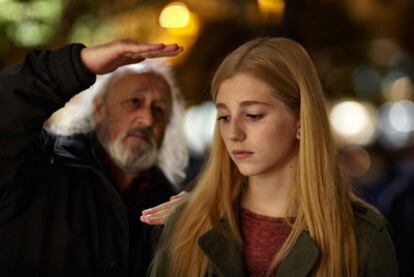"Nobody can escape their demons - however developed society is"
In his latest picture, Oscar-nominated director Montxo Armendáriz tackles child abuse - still a major taboo in Spain
With his curly mane of white hair Montxo Armendáriz has always had something of the air of a prophet about him. He put immigration on the table before anyone in Letters from Alou (1990); he dealt with historical memory when the issue was still in its infancy in Silencio roto in 2001 and examined the first murmurings of youth nihilism in Stories from the Kronen in 1994. For this Navarran filmmaker born in 1949, cinema is both entertainment and social weapon. His films, such as the Oscar-nominated Secrets of the Heart, are deep analyses of society at various levels and various scales that coexist to form spiderwebs of meaning.
His latest movie, No tengas miedo (or, Don't be afraid), in Spanish cinemas this week, dares to tackle the tough issue of child abuse, doing so with elegance, delicacy and rawness and drawing brave performances from leads Lluís Homar, Belén Rueda and Michelle Jenner.
"The key was to find the look that narrates the horror in which these people live"
Q. I already know that for you there's nothing more ridiculous than talking about your films. But your new work needs to be explained well because the issue of child abuse is so completely taboo. Why did you dare make it?
A. For two reasons: due to discovering the issue via psychologists and psychiatrists. It was through them that I accessed information about the physical and psychological consequences [of abuse] that carry with them a great wealth of dramatic possibilities to construct a story with. I think cinema is a fundamental weapon for putting social problems that need to be tackled before our eyes. This is even more the case with a topic that nobody wants to speak about, nobody wants to recognize or confront...
Q. But with this topic it's about showing without showing, of [...] narrating from the point of view of the taboo, with suppositions, questions, looks and suggestions of darkness.
A. In formal terms, I tried shooting it in a natural way, without artifice, in single takes so we could easily see what is happening inside the protagonist [...] The key was to find the point of view, the right look to narrate the horror in which these people live, how these facts destroy lives...
Q. As much as you construct progress and sophistication, abuse happens and responds to the most primal instincts. Why?
A. Nobody can escape their demons, however developed society is. In Spain people run away from the issue; they don't want to hear or talk about it.
Q. That is one of the biggest risks of the film [...] that nobody will want to enter the cinema. How will you convince them?
A. I think cinema has that social mission that [Jean] Renoir talked about. He said perfect films didn't interest him, rather those that served to build bridges to human knowledge. [...] But I was interested in telling this story in a positive way, as a struggle for personal improvement, getting across that you can get out of the well. But before you can do that you have to recognize it and face it.
Q. The bravery of the actors in picking these roles, particularly Lluís Homar and Belén Rueda, father and mother of the abused girl, is admirable [...] I wouldn't like to say who of the two is worse - which one acts and which doesn't want to see?
A. The two of them. Both are participants in the same event. One as an accessory after the fact and the other as the aggressor. In the case of the actors, it's true, they are not roles that are going to earn them affection and admiration from the audience. But it highlights their great professionalism.
Q. Did you let Michelle Jenner, the daughter, know what she was letting herself in for?
A. I don't give them a text from the film in the tests. I give them other things in which there are similar situations. She did a great test and when I handed her the script she was a little frightened. You'll have to help me, she said. [...] She had to start rehearsing two months before and to prepare with victims, psychologists, books and all types of films.

Tu suscripción se está usando en otro dispositivo
¿Quieres añadir otro usuario a tu suscripción?
Si continúas leyendo en este dispositivo, no se podrá leer en el otro.
FlechaTu suscripción se está usando en otro dispositivo y solo puedes acceder a EL PAÍS desde un dispositivo a la vez.
Si quieres compartir tu cuenta, cambia tu suscripción a la modalidad Premium, así podrás añadir otro usuario. Cada uno accederá con su propia cuenta de email, lo que os permitirá personalizar vuestra experiencia en EL PAÍS.
¿Tienes una suscripción de empresa? Accede aquí para contratar más cuentas.
En el caso de no saber quién está usando tu cuenta, te recomendamos cambiar tu contraseña aquí.
Si decides continuar compartiendo tu cuenta, este mensaje se mostrará en tu dispositivo y en el de la otra persona que está usando tu cuenta de forma indefinida, afectando a tu experiencia de lectura. Puedes consultar aquí los términos y condiciones de la suscripción digital.




























































